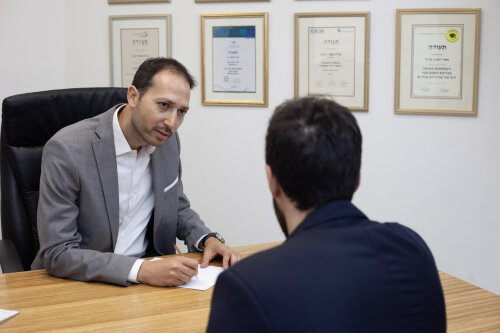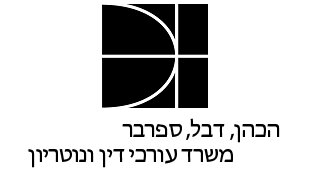Best Collaborative Law Lawyers in Jerusalem
Share your needs with us, get contacted by law firms.
Free. Takes 2 min.
Free Guide to Hiring a Family Lawyer
List of the best lawyers in Jerusalem, Israel
About Collaborative Law in Jerusalem, Israel
Collaborative Law, also known as Collaborative Practice, is a legal process primarily utilized for resolving family law disputes in a non-adversarial manner. It involves both parties agreeing to work together, along with their lawyers, to reach a mutually satisfactory resolution without resorting to litigation. In Jerusalem, Israel, Collaborative Law is increasingly becoming an alternative to traditional courtroom battles, promoting a respectful and cooperative approach to conflict resolution.
Why You May Need a Lawyer
There are several scenarios where individuals might seek legal assistance in the realm of Collaborative Law in Jerusalem, Israel:
- Divorce or Separation: When couples decide to dissolve their marriage or partnership, a collaborative approach can help them achieve a fair and amicable settlement.
- Child Custody and Support: Collaborative Law provides a forum for parents to negotiate and create child custody and support arrangements that prioritize the best interests of their children.
- Property Division: Collaborative Law can help couples equitably divide their property and assets without the need for a contentious courtroom battle.
- Pre-Nuptial and Post-Nuptial Agreements: Couples can utilize Collaborative Law to create agreements that outline the terms of their relationship and how matters will be handled in the event of a separation.
Local Laws Overview
Understanding local laws is crucial for effectively navigating Collaborative Law in Jerusalem, Israel:
- Family Courts Jurisdiction: Family courts in Israel have jurisdiction over family-related disputes, but Collaborative Law offers an alternative by enabling couples to resolve issues outside of court.
- Under Rabbinical Jurisdiction: Some family disputes, particularly those related to marriage and divorce for Jews, fall under the jurisdiction of Rabbinical courts. Collaborative Law can still be employed to settle these disputes amicably.
- Legal Representation: In Collaborative Law, both parties must have legal representation. Lawyers trained in Collaborative Law work together rather than against each other to help clients reach agreements.
- Confidentiality: Collaborative Law negotiations are confidential, promoting open communication and honesty between parties.
- Binding Agreements: Once an agreement is reached, it can be made legally binding by being recognized and enforced by a court.
Frequently Asked Questions
What is Collaborative Law?
Collaborative Law is a legal approach to dispute resolution where both parties and their lawyers agree to work together to reach a mutually acceptable solution, avoiding court litigation.
How does Collaborative Law differ from traditional court proceedings?
Collaborative Law differs from traditional court proceedings by focusing on cooperation and negotiation rather than adversarial litigation. All parties commit to resolving their issues respectfully and outside of the courtroom.
Is Collaborative Law suitable for all types of disputes?
While Collaborative Law is most commonly used for family disputes, it can also be applied to other types of conflicts, provided all parties are willing to participate in the collaborative process.
What happens if an agreement cannot be reached?
If an agreement cannot be reached through Collaborative Law, the parties may have to pursue traditional litigation. Importantly, the lawyers involved in the collaborative process cannot represent the parties in court if the process fails.
Are the agreements reached in Collaborative Law legally binding?
Yes, agreements reached through Collaborative Law can be made legally binding by being submitted to a court for recognition and enforcement.
Do both parties need a lawyer in Collaborative Law?
Yes, both parties are required to have their own Collaborative Law-trained lawyer to ensure that each party's rights and interests are fully represented during negotiations.
How long does the Collaborative Law process typically take?
The duration of the Collaborative Law process can vary based on the complexity of the issues and the willingness of the parties to cooperate. Generally, it is faster than traditional litigation.
Is Collaborative Law a confidential process?
Yes, one of the key principles of Collaborative Law is confidentiality, which encourages open and honest communication between the parties.
Can I still go to court if the Collaborative Law process doesn't work?
Yes, if the process does not lead to a resolution, you retain the right to take your case to court. Your collaborative lawyers, however, cannot represent you in the ensuing litigation.
What are the costs associated with Collaborative Law?
Costs can vary depending on the complexity of the case and the duration of the negotiation process. Generally, Collaborative Law can be more cost-effective than traditional court litigation due to its typically shorter timeframe and cooperative nature.
Additional Resources
If you need more information or assistance regarding Collaborative Law in Jerusalem, Israel, consider the following resources:
- Israel Collaborative Law Association: An organization dedicated to promoting and training lawyers in Collaborative Law practices.
- Family Courts in Jerusalem: Local family courts that can provide insights and legal guidance specific to family law disputes.
- Israeli Bar Association: Offers directories and resources for finding qualified Collaborative Law lawyers.
Next Steps
If you believe Collaborative Law may be beneficial for your situation, here are the steps you should take:
- Research: Learn more about Collaborative Law and assess whether it aligns with your needs and goals.
- Find a Lawyer: Seek out a lawyer trained in Collaborative Law. The Israeli Bar Association or Israel Collaborative Law Association can help you find qualified professionals.
- Initial Consultation: Schedule a consultation with a Collaborative Law lawyer to discuss your case and understand the process and costs involved.
- Commit to the Process: If you decide to proceed, commit to the principles of Collaborative Law, including openness, honesty, and cooperation.
By taking these steps, you can begin the process of resolving your legal disputes in a more collaborative and less adversarial manner.
Lawzana helps you find the best lawyers and law firms in Jerusalem through a curated and pre-screened list of qualified legal professionals. Our platform offers rankings and detailed profiles of attorneys and law firms, allowing you to compare based on practice areas, including Collaborative Law, experience, and client feedback.
Each profile includes a description of the firm's areas of practice, client reviews, team members and partners, year of establishment, spoken languages, office locations, contact information, social media presence, and any published articles or resources. Most firms on our platform speak English and are experienced in both local and international legal matters.
Get a quote from top-rated law firms in Jerusalem, Israel — quickly, securely, and without unnecessary hassle.
Disclaimer:
The information provided on this page is for general informational purposes only and does not constitute legal advice. While we strive to ensure the accuracy and relevance of the content, legal information may change over time, and interpretations of the law can vary. You should always consult with a qualified legal professional for advice specific to your situation.
We disclaim all liability for actions taken or not taken based on the content of this page. If you believe any information is incorrect or outdated, please contact us, and we will review and update it where appropriate.

















